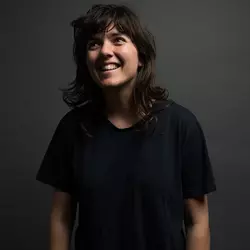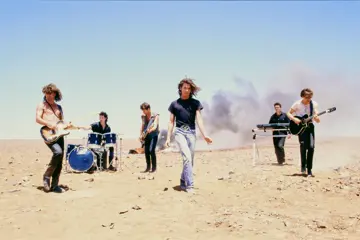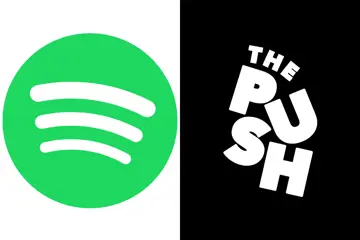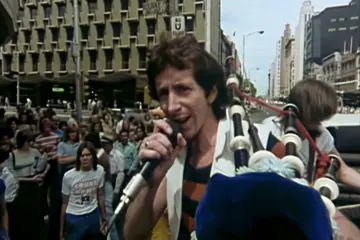 Courtney Barnett
Courtney BarnettSadly, their milk moustaches have been wiped off by the time this scribe arrives at Kane Hibberd's studio in Richmond. Courtney Barnett and Jen Cloher, who run Milk! Records, are present together with three other representatives from the label's roster: Fraser A Gorman, Oliver Mestitz (The Finks) and Marcus Hobbs (East Brunswick All Girls Choir). All are colour coordinated (white T-shirts, black jeans) and scattered around the room (some seated on couches, others standing) waiting to be summoned for their portrait shots. Gorman says he's playing a gig with Dan Kelly tonight at Richmond Theatrette, someone else says they're probably heading down to Monday Night Mass at Northcote Social Club and it's immediately apparent they're all mates.
"Milk! Records is really just a platform for artists to come together, create music."
While Barnett poses for her portrait, we usher Cloher into an adjoining room to commence our chat. She's been running I Manage My Music workshops "for about five years" now and elaborates, "I started them because I was curious to find out how other independent artists were managing to stay afloat. Because when you're funding it yourself — and often managing it yourself — aside from having a kind of burnout factor, it's really expensive and I just couldn't work out how people were doing it, and I wanted to find out. So I started the workshops as a kind of forum for independent songwriters and artists to come together and just talk about some of the challenges of trying to record." Some of the keynote speakers who have taken part in I Manage My Music workshops so far include Wally De Backer (Gotye), Mick Harvey ("talking about managing The Birthday Party"), Mia Dyson and "Courtney coming in and talking about that whole sort of independent start and starting a label". Cloher has been able to put her findings into practice through Milk! Records. "In a way, Milk! Records is really just a platform for artists to come together, create music. Like, this is our second compilation. Our first one [A Pair Of Pear (With Shadows)] was a huge success in its own right. And when I say success, you know, I guess it just took the profile of the label to the next step 'cause I don't actually think many people knew about Milk! Records."
Trying to avoid getting into debt can be challenging for independent artists and Cloher admits, "Well that's the whole premise that I run business from now is that, you know, you just don't go into debt; so whatever you have in your bank account, whatever kind of savings, that's what you have to work with." And if you think you need more money? "We went for some grants to do this tour. We crowdfunded on the first compilation, so we had all those pre-orders confirmed then we could go ahead and make sure we weren't going into any kind of debt."
While Cloher explains, "It's really kind of just me working the background logistics [of the label]," Barnett joins us just in time to answer the following question: Do they have one of those wet spongey things or do they have to personally lick all the postage stamps? They laugh. "We've got stamps now," Barnett reveals. Cloher clarifies, "We've got an actual Postage Paid Australia [stamp]."
"You need to be some major fuckin' whoever — Sony or something, haha, whatever they are called: the big ones."
Don't miss a beat with our FREE daily newsletter
The first Milk! Records 10" compilation was recorded over a weekend, as was the upcoming Good For You EP. "We weren't writing, like, on the spot," Cloher stresses and then Barnett recalls, "Oh, yeah. I hadn't showed my song to the boys [Bones Sloane, bass; Dave Mudie, drums] yet, though. So we got in the studio and I was like, 'Okay, it goes like this!'" she laughs, miming playing chords and providing the appropriate sound effects.
When asked how the idea for this EP took flight, Barnett tells, "We did the first one [compilation] two years ago and it was more just to do something that wasn't a single — or an album, or an EP — or whatever… [For] this one we were like, 'Okay, why don't we set a kind of loose title-slash-subject matter, um, which was Good For You." Cloher interjects, "Oliver came up with that title."
"Yeah, Oliver came up with it. So it was like, you know, it doesn't have to be the title or in the song at all, but it could mean, like, a lot of different things. So that was very loosely kind of the task. I dunno, it was interesting writing in a slightly different way, you know, not for — and I kind of just wrote this, like, full-on pop song, which was really different, so it just kinda makes you think differently."
"It's a kinda fun thing where you can experiment and just try some different stuff," Cloher opines. "And it's not, like, 'This is the next single from my album,' or, 'This is my career-defining single that I'm putting out into the world', it's just something that you can pop on the compilation. But, I think, it's not people's leftovers and that's been recognised with both compilations: that we bring our best songs to the table and that you're getting a quality collection of songs that we've thought about. And I think the main thing kind of around the compilation, and the idea is, like, to bring everybody together in a creative experience and that's really what we're interested in."
Interestingly enough, Milk! Records haven't really had to make any changes to fall in line with the evolution of music consumption because they continue to "sell a lot of physical merchandise", shares Cloher. "T-shirts and vinyl, that's really the majority of stuff that we sell, so I think people still really want that physical thing to take home and look at. And even more so, you know, I think it's returning. But I think what Milk! really captures — and I think this is timeless, I don't think this will ever go away — that direct sense of community, and that the fans are as much a part of the label and what's going on, you know? And that engagement is very direct."
On the challenges and expense of pressing vinyl, Cloher offers, "Well we have to go offshore because there's only one pressing plant in Australia." Barnett jumps in: "But that only reopened recently, before that reopened we'd been getting it from overseas and the shipping obviously takes time as well; like, we have to give ourselves six months now." Jack White opened a pressing plant behind his label's record store in Detroit late last year and, given vinyl's resurgence, surely it makes sense to open more pressing plants? "Yeah, it's like this ongoing conversation, you know, between friends and the music world. It's just apparently too expensive for anyone to take it on. It's weird, you need to be some major fuckin' whoever — Sony or something, haha, whatever they are called: the big ones."
"Court and I have talked a lot about, 'What is Milk! Records?' and, yeah! We put out records, but that's not our focus. Our focus is actually around group projects like the compilation, like touring together. I guess it's more kind of an artist-run collective than a traditional label that's got, you know, 15 releases that they're plugging away at putting out. Like, last year, 2014, we didn't release a single album," Cloher laughs and then Barnett contributes, "Yeah, last year we released three." Cloher corrects: "Four! Four debut albums last year: yours, Fraser's, The Finks, Ouch My Face." Barnett concurs: "Oh, yeah!"
We discuss scheduling release dates and whether it's possible to try and work out when priority releases from rival labels are dropping in order to avoid going up against them. "I dunno," Barnett ponders. "Yeah, there's probably a way to do things that are great, but I just don't like those formulas; that everyone thinks that to follow this formula is the way to find success, and it just ends up being boring."
"It's also that thing where you go, 'They're thinking about ARIA charting'," Cloher adds. Barnett agrees: "True."
"And we're not really thinking about ARIA charting, we don't care. But my feeling about all of that stuff - and you'd probably agree — is, like: great albums do get noticed, but it might just take more time for people to discover [them]."















